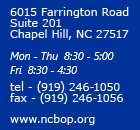Pharmacist FAQsFrequently Asked Questions for Pharmacists on Epinephrine Auto-Injectors
Q: I received a prescription for an epinephrine auto-injector for a [camp, college, park, restaurant, etc.]. May I dispense that prescription even though it is not written for a specific patient? A: Yes. N.C.G.S. 90-21.15A (found here: https://www4.ncleg.net/enactedlegislation/statutes/html/bysection/chapter_90/gs_90-21.15a.html) allows a prescriber to prescribe an epinephrine auto-injector to an “authorized entity” (defined as “any entity or organization . . . at which allergens capable of causing anaphylaxis may be present, including, but not limited to, recreation camps, colleges, universities, day care facilities, youth sports leagues, amusement parks, restaurants, places of employment, and sports arenas”). Pharmacists may dispense such prescriptions “issued in the name of an authorized entity.” ---------------------------------------------------------------------------------- Q: How can schools obtain epinephrine auto-injectors as required by state law? A: On January 1, 2015, a Board rule amendment became effective that allows registered nurses at local health departments to dispense epinephrine auto-injectors prescribed in compliance with the new statute. Read the updated guidance here: http://www.ncbop.org/faqs/Pharmacist/GuidanceEpinephrineAutoInjectorStatuteDec2014.pdf. ---------------------------------------------------------------------------------- Q: How should pharmacists counsel patients on proper use of epinephrine auto injectors? A: As pharmacists are aware, there are several epinephrine auto injector products on the market – eg, EpiPen, Twinject, Adrenaclick. Because epinephrine auto injectors are used in emergency situations, it is crucial that pharmacists dispensing these devices ensure that the patient or the patient’s caregiver is adequately trained on their proper use at the time of dispensing. Pharmacists must not assume that the patient or patient’s caregiver has been trained by others. Of course, if a prescriber writes for a particular epinephrine auto injector and signs the prescription “dispense as written” (or handwrites “brand medically necessary” where Medicaid patients are concerned), the pharmacist must dispense the indicated product. If substitution is permitted, the pharmacist may do so as allowed by North Carolina law. In either case, the pharmacist should be certain that the patient or patient’s caregiver has been trained on proper use of the particular device dispensed. Absent such training, a patient’s life could be placed in danger. ---------------------------------------------------------------------------------- Q: What types of epinephrine auto injectors are on the market? A: Board staff reiterates these crucial public safety points to pharmacists. New epinephrine auto injector products have entered the market since January 2011. Currently marketed epinephrine auto-injectors include: Twinject (0.15 mg and 0.3 mg per delivery); Adrenaclick (0.15 mg and 0.3 mg per delivery); Auvi-Q (0.15 mg and 0.3 mg per delivery); Epi-Pen (0.3 mg per delivery); Epi-Pen Jr. (0.15 mg per delivery). Each product carries an Orange Book “BX” rating with respect to other epinephrine auto injectors. Lineage Therapeutics markets epinephrine injection, USP auto injector, in 0.15 mg and 0.3 mg strengths. This product is an Orange Book AB rated product to Adrenaclick only. Critically, different epinephrine auto injectors have different operational instructions. When an auto injector is needed, seconds matter. Accordingly, it is imperative that pharmacists: (1) strictly follow relevant law governing substitution; and (2) train the patient or caregiver thoroughly on the proper use of the particular device prescribed and dispensed.
|

